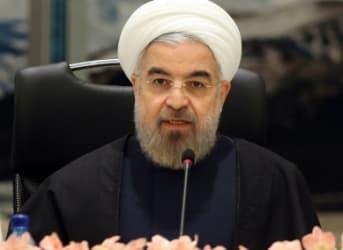Iranian President Hassan Rouhani says he intends to reach a deal with West and end years of sanctions despite the objections of a “few” opponents who use their country’s crippled economy to enhance their own power.
“Some people may not like to see the sanctions lifted. Their numbers are few, and they want to muddy the water,” Rouhani told an audience on Dec. 15 at the Central Bank in Tehran. He evidently was referring to hard-liners, including leaders of Iran’s elite Revolutionary Guards, who oppose any rapprochement with the West, to maintain their grip on the country's economy.
“The overwhelming majority of our nation – intellectuals, academics, theologians, the greats, and the leadership – are in favor of getting the sanctions removed,” said Rouhani, who became president on Aug. 3 pledging to negotiate an end to the sanctions and to end Iran’s isolation from the rest of the world.
Related: Iran Leader Says US Not Only Target Of Suspected Saudi Oil Price War
He said coming to terms with the West will economically benefit all Iranians, not just the country’s political, military and religious elite. “The people will achieve their rights,” he said. “You should also prepare for interaction with the world. You should know that in the near future many investors will come to our country.”
As Rouhani was speaking in Tehran, U.S. and Iranian negotiators in Geneva began two days of preliminary meetings about the 12-year-old dispute over Iran’s nuclear program. Tehran has consistently argued that its program is peaceful, but many in the West believe it may lead to nuclear weapons.
Broader talks are expected to resume between all the parties in the negotiations: the five permanent members of the UN Security Council – Britain, China, France, Russia and the United States – plus Germany. The group is also known as the P5+1.
Earlier talks failed to reach an agreement by a deadline in November, but the two sides appeared to have come close enough at the time that the deadline was extended until July 2015. Rohani has consistently expressed optimism about their outcome, and his foreign minister, Mohammad Javad Zarif, has said an accord could be reached within “weeksIran’s Murky Nuclear Past May Disrupt Its Future.”
In fact, the goal of the P5+1 is to agree on the basic outline of a deal by the end of March 2015, then work out the technical specifics of the deal during the three months remaining before the new deadline.
Related: Iranian Nuclear Talks To Continue Until July
The preliminary meeting on Dec. 15 between officials from Tehran and Washington was led by Iranian Deputy Foreign Minister Abbas Araqchi and Wendy Sherman, the US acting deputy secretary of state. Some small progress was reported.
“Some differences have been bridged, some others haven’t,” a delegate to the meeting told Iran’s official Islamic Republic News Agency, according to Reuters. “There is need for more diplomacy and consultations.”
ADVERTISEMENT
The sticking point in the long dispute has been Tehran’s objection to limiting its uranium enrichment facilities, which can have both peaceful and military uses. It is that reluctance that has led to the sanctions.
By Andy Tully of Oilprice.com
More Top Reads From Oilprice.com:
- Iran’s Murky Nuclear Past May Disrupt Its Future
- End Of Life Costs For Nuclear Power A Real Concern
- Oil Wars: Why OPEC Will Win

















